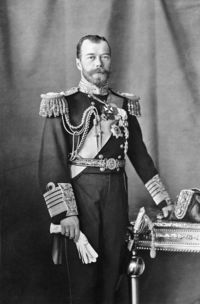
Tsar Nicholas II
Actor
St. Petersburg, Russian Empire [now Russia]
Nicholas II (Николай II Алекса́ндрович; 1868 – 17 July 1918) was the last Emperor of Russia, ruling from 1 November 1894 until his forced abdication on 15 March 1917. His reign saw the fall of the Russian Empire from being one of the foremost great powers of the world to economic and military collapse. Due to the Khodynka Tragedy, anti-Semitic pogroms, Bloody Sunday, the violent suppression of the 1905 Revolution, the execution of political opponents and his perceived responsibility for the Russo-Japanese War, he was given the nickname Nicholas the Bloody by his political adversaries. Soviet historiography portrayed Nicholas as a weak and incompetent leader, whose decisions led to military defeats and the deaths of millions of his subjects. Russia suffered a decisive defeat in the 1904-05 Russo-Japanese War, which saw the annihilation of the Russian Baltic Fleet at the Battle of Tsushima, loss of Russian influence over Manchuria and Korea, and the Japanese annexation of South Sakhalin. The Anglo-Russian Entente, designed to counter German attempts to gain influence in the Middle East, ended the Great Game between Russia and the United Kingdom. Nicholas approved the Russian mobilisation on 30 July 1914, which led to Germany declaring war on Russia on 1 August 1914. It is estimated that around 3,300,000 Russians were killed in the First World War. The Imperial Army's severe losses and the High Command's incompetent management of the war efforts, along with the lack of food and other supplies on the Home Front, were the leading causes of the fall of the Romanov dynasty. Following the February Revolution of 1917, Nicholas abdicated on behalf of himself and his son. Nicholas and his family were imprisoned and transferred to Tobolsk in late summer 1918. On 30 April 1918, Nicholas, Alexandra and his mother Marie were handed over to the local Ural Soviet in Ekaterinburg; the rest of the captives followed on 23 May. With the approval of Lenin, Sverdlov and the rest of the top Bolshevik party leadership, Nicholas and his family were eventually executed on the night of 16–17 July 1918. The recovered remains of the Imperial Family were finally re-interred in St. Petersburg, eighty years to the day on 17 July 1998. In 1981, Nicholas, his wife and their children were canonised as martyrs by the Russian Orthodox Church Outside Russia, located in New York City. On 15 August 2000 Nicholas and his family were canonised as passion bearers, a title commemorating believers who face death in a Christ-like manner, by the Russian Orthodox Church within Russia.
Nicholas II (Николай II Алекса́ндрович; 1868 – 17 July 1918) was the last Emperor of Russia, ruling from 1 November 1894 until his forced abdication on 15 March 1917. His reign saw the fall of the Russian Empire from being one of the foremost great powers of the world to economic and military collapse. Due to the Khodynka Tragedy, anti-Semitic pogroms, Bloody Sunday, the violent suppression of the 1905 Revolution, the execution of political opponents and his perceived responsibility for the Russo-Japanese War, he was given the nickname Nicholas the Bloody by his political adversaries. Soviet historiography portrayed Nicholas as a weak and incompetent leader, whose decisions led to military defeats and the deaths of millions of his subjects.
Russia suffered a decisive defeat in the 1904-05 Russo-Japanese War, which saw the annihilation of the Russian Baltic Fleet at the Battle of Tsushima, loss of Russian influence over Manchuria and Korea, and the Japanese annexation of South Sakhalin. The Anglo-Russian Entente, designed to counter German attempts to gain influence in the Middle East, ended the Great Game between Russia and the United Kingdom.
Nicholas approved the Russian mobilisation on 30 July 1914, which led to Germany declaring war on Russia on 1 August 1914. It is estimated that around 3,300,000 Russians were killed in the First World War. The Imperial Army's severe losses and the High Command's incompetent management of the war efforts, along with the lack of food and other supplies on the Home Front, were the leading causes of the fall of the Romanov dynasty.
Following the February Revolution of 1917, Nicholas abdicated on behalf of himself and his son. Nicholas and his family were imprisoned and transferred to Tobolsk in late summer 1918. On 30 April 1918, Nicholas, Alexandra and his mother Marie were handed over to the local Ural Soviet in Ekaterinburg; the rest of the captives followed on 23 May. With the approval of Lenin, Sverdlov and the rest of the top Bolshevik party leadership, Nicholas and his family were eventually executed on the night of 16–17 July 1918. The recovered remains of the Imperial Family were finally re-interred in St. Petersburg, eighty years to the day on 17 July 1998.
In 1981, Nicholas, his wife and their children were canonised as martyrs by the Russian Orthodox Church Outside Russia, located in New York City. On 15 August 2000 Nicholas and his family were canonised as passion bearers, a title commemorating believers who face death in a Christ-like manner, by the Russian Orthodox Church within Russia.
Tsar Nicholas II Movies & TV Shows - Watch Online

